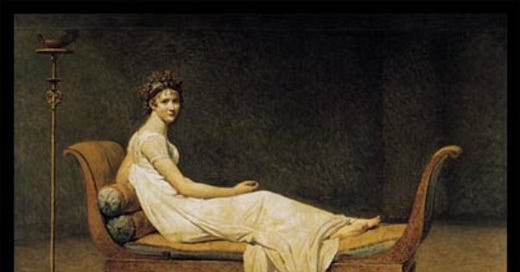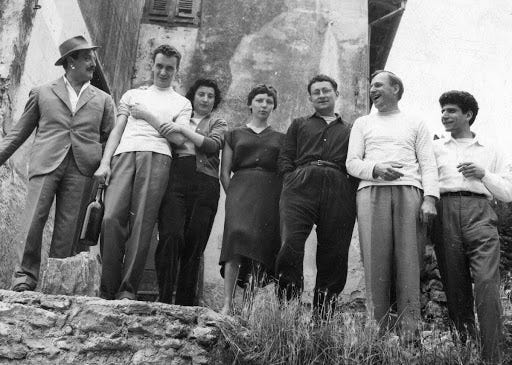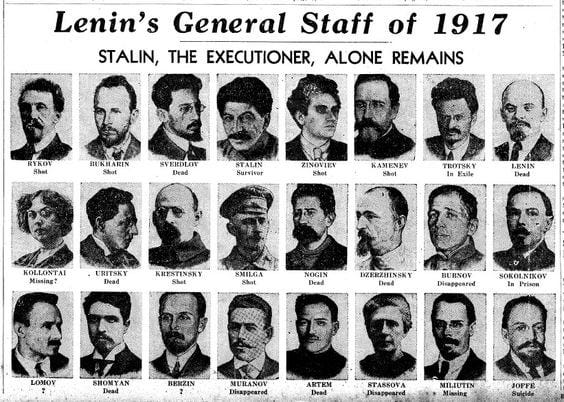Anselm Jappe, in his book, Guy Debord, argues that, “Debord’s theory is in essence the continuation of the work of Marx and Hegel and that its importance inheres for the most part precisely in this fact” [emphasis in the original].
According to Hegel, the application of abstract principles in law and economics was a further negation of the organic unity of life he saw as having once existed in Greek Antiquity. The unity of subject and object expressed in the art of Greek Antiquity had become impossible for a society in which, according to Hegel, the “lower world” of economic nature (once vested in the “family” or “household”) promoted a “bestial contempt for all higher values.” All sense of the divine had been tossed into the world of “superstition” and “entertainment,”[i] the temple reduced to “logs and stones” and “the sacred grove to mere timber.”[ii]
What then was left for art? Hegel said that “as regards its highest vocation, art is and remains for us something past. For us it has lost its genuine truth and vitality; it has been displaced into the realm of ideas.”
Hegel did not doubt that works of art would continue to be produced and that artists would strive for perfection with new imaginative techniques. In modernity. however, what is aroused in us by art beyond immediate enjoyment is “the judgment that submits the content and medium of representation of art to reflective consideration… For this reason, the science of art is a far more important requirement in our own age than it was in earlier times when art simply as art could provide complete satisfaction.”[iii]
In 1967, Guy Debord wrote in the Society of the Spectacle that the defeat of the social revolutions following the First World War had left the Surrealists and the Dadaists “imprisoned in the same artistic field whose decrepitude they had denounced.” Furthermore, Surrealism had mistakenly put itself “au service” of a revolution in Russia which had already been lost. Whereas “Dadaism had tried to repress art without realising it; Surrealism wanted to realise art without suppressing it.” What was necessary, in Debord’s view, was to project suppression and realization as “inseparable aspects of a single supersession of art.”[iv]
In July 1957, at a conference in Cosio d’Arroscia, Italy, the Situationist International was founded. Those attending were: from France, Guy Debord and Michèle Bernstein of the Letterist International; from England, the painter Ralph Rumney; from Denmark, the painter Asger Jorn; and from Italy, Guiseppe Pinot Gallizio, the formulator of “industrial painting,” Walter Olmo, experimental musician, and Piero Simondo and Elena Verrone of the International Movement for an Imaginist Bauhaus.
Debord argued in his Report on the Construction of Situations and the Prerequisites for the Organization and Action of the International Situationist Tendency that “the problems of cultural creation can now be solved only in conjunction with a new advance in world revolution.” In order to combat the passive consumption that defined spectacular culture, Debord called for the international to organize collectively towards utilizing all of the means of revolutionizing everyday life, “even artistic ones.”
We need to construct new ambiances that will be both the products and the instruments of new forms of behavior. To do this, we must from the beginning make practical use of the everyday processes and cultural forms that now exist, while refusing to acknowledge any inherent value they may claim to have... We should not simply refuse modern culture; we must seize it in order to negate it. No one can claim to be a revolutionary intellectual who does not recognize the cultural revolution we are now facing...[v]
Although any genuinely experimental attitude based on critique and supersession of existing conditions was usable, production of artistic forms was seen as a dead end, leading at best to recuperation and commodification within the spectacle:
It must be understood once and for all that something that is only a personal expression within a framework created by others cannot be termed a creation. Creation is not the arrangement of objects and forms, it is the invention of new laws on such arrangement.[vi]
Debord said in 1961 at Henri Lefebvre’s Group for Research on Everyday Life:
the critique and perpetual re-creation of the totality of everyday life, before being carried out naturally by all people, must be undertaken in the present conditions of oppression in order to destroy these conditions. An avant-garde cultural movement, even one with revolutionary sympathies, cannot accomplish this. Neither can a revolutionary party on the traditional model, even if it accords a large place to criticism of culture... The revolutionary transformation... will mark the end of all unilateral artistic expression stocked in the form of commodities, and at the same time the end of all specialized politics.[vii]
Georg Lukács’ History and Class Consciouness (1923) saw in the reformism of social democracy a retreat from Hegel and Marx to Kant. Before Hegel and the French Revolution, the rationalists had treated objectivity as independent of, and separate from, the thinking subject; and for Kant, the object was knowable only in how it appeared to the subjective mind, not as the thing-in-itself. In Hegel’s concept of totality this duality in the process of knowledge is resolved by eliminating the autonomy of both the objects and their concepts. The power of the totality is expressed in Lukács’ statement that “the chapter in Marx’s Capital dealing with the fetish character of the commodity contains within itself the whole of historical materialism.”[viii] In Capital Marx shows how the value-form which labor assumes depends on the reduction of the concrete labor to abstract labor, which takes place in the production of commodities through the medium of socially necessary labor time.
The Society of the Spectacle argues that the spectacle does not falsify reality merely in an ideological sense, along the lines of the economic base producing false consciousness in the superstructure; nor does the spectacle constitute itself abstractly as a force external to the concrete social activity of individuals. Rather, the spectacle-commodity and reality each transform themselves into their opposites. The spectacle is a real product of that reality; and “real life,” in its subjective passivity, absorbs its own objectified falsification. Their reciprocal alienation is the ground and essence of spectacular capitalism, in which the world is turned upside down:
The spectacle is able to subject human beings to itself because the economy has already totally subjugated them. It is nothing other than the economy developing for itself. It is at once a faithful reflection of the production of things and a distorting objectification of the producers.[ix]
Where then, does this leave proletarian class consciousness? Lukács, in his 1923 essay, ‘Reification and the Consciousness of the Proletariat’, argues that work, as a social-metabolic process, is reified and fragmented in a such a way as to make people incapable of recognizing the world beyond their own particular tasksas being of their own making. People are thus rendered passive and contemplative, no matter how “busy” they are.[x] Against the fragmenting yet totalizing power of the commodity Lukács dialectically juxtaposes the particular commodity that production is based on: labor-power. Since labor-power cannot be separated from the laborer, then any real self-consciousness on the laborer’s part of that relationship can be “ascribed” as revolutionary. Lukács thus postulates a “subject-object identity” constituted by the class that “wakes up” to mass revolutionary consciousness.
Lukács, however, is well aware of the gap between the “ascribed” revolutionary consciousness and the actually existing reformist/false consciousness. Reification, as the “necessary, immediate reality of every person living in capitalist society,” can be overcome only by “constant and constantly renewed efforts to disrupt the reified structure of existence” and by relating the “concretely manifested contradictions” to the totality of development, and becoming conscious of the immanent meanings of these contradictions in their totality.[xi]
Debord, taking up this problem of the passive and contemplative nature of everyday life under capitalism, sees the leisure industry, with its Club Med holidays, mass sports events, television and movies, as much more than mere distraction. In “consumable pseudo-cyclical time” the commodified moments of leisure are explicitly presented as moments in the cyclical return of real life, but all that is really happening is the spectacle reproducing itself at a higher level of intensity: “The moments within cyclical time when members of a community joined together in a luxurious expenditure of life are impossible for a society that lacks both community and luxury.”[xii]
Debord argues that because the spectacle attempts to establish an illusory unity over the fragmentation and separation, any real proletarian subjectivity cannot confine itself to concerns over egalitarian distribution of wealth; it must be total itself. The real social contradiction is between those who are at home in alienation – or at least feel obliged to maintain it – and those who would abolish it. The coming revolution would require a complete break with vanguardism as well as anarcho-councilism.[xiii]
As Debord puts it in Society of the Spectacle, Lukács claimed that the Bolshevik form of organization “was the long sought mediation between theory and practice, in which proletarians are no longer spectators of the events which happen in their organization, but consciously choose and live these events.” The trouble was, “he was actually describing as merits of the Bolshevik party everything that the Bolshevik party was not.”[xiv]
The Situationists’ grasp of the difference between class consciousness in-itself and in-and-for-itself was at the root of their polemical attacks on the bureaucratic practices in the workers’ movement and the fragmented, contemplative ideas of sociologizing intellectuals. Situationist writings suggested that workers could reach revolutionary conclusions among themselves and that the Situationist International saw no responsibility for helping this process along, unless approached by the workers’ councils themselves for assistance.
Debord thought that the French revolt of May/June 1968, soon to be followed by the “Hot Autumn” of Italy in 1969, heralded “the beginning of a new era,”[xv] But he had no intention of building a new political party, either on a national or international basis, that would become, like others past and present, yet another “representation” of the real struggle. The Situationists, as les enfants perdus, had no further missions to fulfill in the organizational form they had upheld for the previous fourteen years, and nowhere to return to. In 1972, after a final round of resignations and expulsions, which left Debord and the Italian, Gianfranco Sanguinetti, as the only two remaining members, the Situationist International was dissolved at Debord's behest.
Twenty years after the May Events of 1968, in his 1988 Comments on the Society of the Spectacle, Debord identified the dilemma facing the Left well before the fall of the Berlin Wall and the apparent victory of neoliberalism:
the coherence of the society of the spectacle proves revolutionaries right, since it has become clear that one cannot reform the poorest detail without taking the whole thing apart. But, at the same time, this coherence has suppressed every organized revolutionary tendency by suppressing the social terrains where they had more or less expressed themselves: from trade unions to newspapers, towns to books. In the same movement, one has highlighted the incompetence and thoughtlessness of which this tendency was quite naturally the bearer.[xvi]
In 1967, Debord had noted the ever-increasing size of the working class and the impending proletarianization of the entire workforce. But in the Comments of 1988, Debord, as Jappe puts it, “reversed the terms of this proposition”: the conditions of the middle classes had become proletarianized in their separation and lack of power but, as they lacked class consciousness, they had negated the power of the proletariat as a force irreconcilable with capital, by absorbing it. In late-Debord thought, the early-Lukács’ formulation of a structure of reified consciousness evolves into that of the “integrated spectacle.”
Debord's “pessimistic” Comments of 1988 should be seen in relation to his original theorizing of the spectacle and the forces resisting it. In distancing the Situationists from both the vanguardist and spontaneist positions, the Society of the Spectacle argued the revolution “requires” workers to become dialecticians:
Proletarian revolution depends entirely on the condition that, for the first time, theory as intelligence of human practice be recognized and lived by the masses. It requires workers to become dialecticians and to inscribe their thought into practice. Thus it demands of men without qualification more than the bourgeois revolution demanded of the qualified men which it delegated to carry out its tasks (since the partial ideological consciousness constructed by a part of the bourgeois class was based on the economy, that central part of social life in which this class was already in power). The very development of class society to the stage of spectacular organization of non-life thus leads the revolutionary project to become visibly what it already was essentially.[xvii]
The idea that the organized working class would become “visibly what it already was essentially” bears a similarity to C.L.R. James’ position on the British shop stewards organizations in the 1950s as representing the “future in the present.”[xviii] Debord’s reflections about the importance of theory being lived by the masses and the workers becoming “dialecticians” bears more than a passing resemblance to (if not a subtle détournement of) Dunayevskaya’s portrayal in Marxism and Freedom (1958) of Black civil rights activists, women, rank-and-file workers and youth as a movement from practice which was itself a form of theory, demanding the engagement from intellectuals she saw lacking in Castoriadias:
The task that confronts our age, it appears to this writer, is, first, to recognize that there is a movement from practice — from the actual struggles of the day — to theory; and, second, to work out the method whereby the movement from theory can meet it.... Far from being intellectual abdication, this is the beginning of a new stage of cognition. This new stage in the self-liberation of the intellectual from dogmatism can begin only when, as Hegel put it, the intellectual feels the “compulsion of thought to proceed to... concrete truths.”[xix]
[The above is an abridged extract from The Philosophical Roots of Anti-Capitalism
Essays on History, Culture and Dialectical Thought by David Black (Lexington 2013)]
[i] Quoted in George Lukács, The Young Hegel, p. 412.
[ii] Hegel, System of Ethical Life, Hegel: System of Ethical Life and First Philosophy of Spirit (State Univ of New York Press: 1988). www.marxists.org/reference/archive/hegel/help/se.htm
[iii] Quoted in Gaiger, “Art as Made and Sensuous: Hegel, Danto and the 'End of Art'.”
[iv] Debord, Society of the Spectacle (Detroit: Black and Red, 1983), ¶191.
[v] Debord, “Report on the Construction of Situations” (1957), S.I. Anthology, pp.17-25.
[vi] Debord, “Report on the Construction of Situations.”
[vii] Debord, “Perspectives for Conscious Alterations in Everyday Life,” International Situationist, No. 6. S.I. Anthology, pp. 68-74.
[viii] Lukács, History and Class Consciousness, p. 170.
[ix] Debord, Society of the Spectacle, ¶8 to 13.
[x] Debord, Society of the Spectacle, ¶35. Lukács, History and Class Consciousness, p. 86.
[xi] Lukács, History and Class Consciousness, p. 103.
[xii] Debord, Society of the Spectacle, ¶153-54.
[xiii] Jappe , Guy Debord, p. 29.
[xiv] Debord, Society of the Spectacle, ¶112.
[xv] “The Beginning of a New Era” (editorial), International Situationist, No. 12; in S.I. Anthology, p.225.
[xvi] Debord, Comments on the Society of the Spectacle (London: Verso, 1998), ¶29.
[xvii] Debord, Society of the Spectacle, ¶123.
[xviii] James, Lee, and Chaulieu, Facing Reality, pp. 34-39.
[xix] Dunayevskaya, “Marx’s Humanism Today,” in Socialist Humanism, ed. Erich Fromm (New York: Doubleday, 1965). In 1971, Debord's publisher, Gérard Lebovici (Editions Champ Libre) brought out a French translation of Dunayevkaya's book, Marxism and Freedom.






